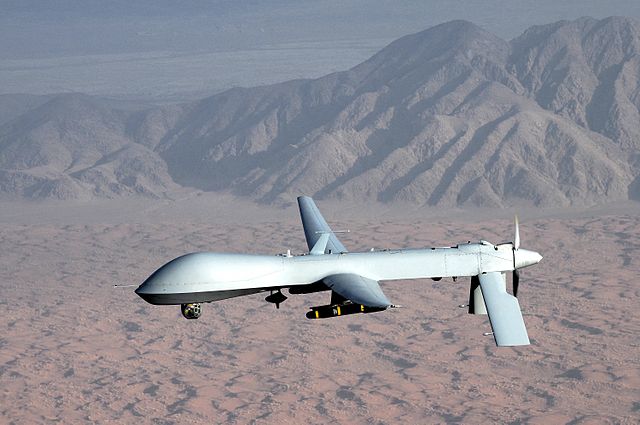 The Pakistani Taliban (the TTP as it is known in Pakistan) has just taken a substantial hit with the death of of Wali-ur-Rehman, the number two of the TTP as a result of an un-manned US drone strike this week. This was confirmed by the TTP today.
The Pakistani Taliban (the TTP as it is known in Pakistan) has just taken a substantial hit with the death of of Wali-ur-Rehman, the number two of the TTP as a result of an un-manned US drone strike this week. This was confirmed by the TTP today.
Wali-ur-Rehman was a very nasty terrorist who, according to the Americans, had been responsible for an attack on a US base in eastern Afghanistan in 2009 which killed nine CIA employees. He had a $5 million US government bounty on his head.
While Rehman was considered less of a hard-liner than TTP chief Hakimullah Mehsud, he directed most of his attention and efforts at fighting the Coalition forces in Afghanistan. He was also linked to the Haqqani Network, which is probably the most lethal anti-Afghan government Taliban force.
Inside Pakistan, as head of the TTP’s operations, he had probably been responsible for the death of thousands of civilians and military personnel for the last six years.
His death will without any doubt further weaken an already fractured and divided TTP. Hakimullah Mehsud will certainly not miss him. They disliked each other and certainly didn’t trust each other. Rehman had hoped to become the leader of the TTP upon the death of the previous leader, Baitullah Mehsud, in a drone strike in four years ago. He always resented being passed over for the top job.
But quite interestingly, apart from the usual Pakistani government official statement of condemnation for this strike, there’s been no public comment from Imran Khan, the famous cricketer-turned-politician whose party has just been sworn in as the new government in Khyber Pakhtunkhwa, the province adjacent to the tribal areas from where the TTP launch their deadly attacks. Imran Khan has been highly critical of the drone strikes, demanding that they cease immediately.
But more importantly, Nawaz Sharif, the soon-to-be installed new Prime Minister, has made no public statement either. That’s probably because he must be quite conflicted by the death of Rehman.
On one hand, Sharif must be pleased to see the removal of Rehman, a man who has caused so much misery in Pakistan. On the other hand, having made a lot of noise in the lead up to the 11 May election about wanting to see an end to the drone strikes, he can hardly publicly celebrate the elimination of Rehman.
However, in the lead up to the 11 May election and several times afterwards, Sharif had made it very clear he wanted to begin negotiations with the TTP as soon as possible, with no pre-conditions attached. And Rehman, considered a ‘moderate’ among the TTP leaders, would probably have been a key player in those negotiations.
The TTP had indicated that it would be interested in talking to the government. However, in the wake of the death of Rehman, the TTP announced that not only were the peace talks off but that it would seek ‘revenge in the strongest way’ by stepping up its terrorist attacks.
Given the poor track record of negotiating with the TTP, the cancellation of the talks might not be such a bad thing. In the past, the government of Pakistan had cut several deals with the TTP and each one of these agreements had been broken by the terrorists. The one that everyone remembers is the one in the Swat Valley in 2009, which eventually led to the TTP fighters coming within 100 km from the capital Islamabad. It took some 35,000 army personnel to dislodge them. Several hundred thousand civilians were displaced in the process.
Certainly the head of the army, General Pervez Kayani, was never keen to talk to the TTP. And if talks did take place he had made it clear on several occasions the TTP would have to first end the terrorist attacks and abide by the law of the land, pre-conditions the TTP would find difficult to accept.
In any case, the successful elimination of the TTP’s number two will be a severe psychological and military blow to the terrorists. It also confirms, yet again, that the drone strikes are very effective at removing the Taliban and al-Qaeda leaders.
So although President Obama stated last week that there would be more restrictive rules in the execution of drone strikes, we can expect more of these drone hits.
Accordingly, Hakimullah Mehsud will need to keep a very low profile because he must know that he’s likely to be the next one on the hit list. His predecessor, Baituallh Mehsud, was killed in a drone strike in 2009, as was the TTP’s previous number two last year, so the odds aren’t looking good for him.
What does this mean for the war in Afghanistan? With a most likely intensification of terrorist attacks in Pakistan—as threatened by the TTP, which would require the diversion of manpower away from the Afghanistan theatre, there may be fewer attacks against Coalition forces, although the group has also vowed to attack American bases linked to the CIA in Afghanistan. In any case, I suspect that any diversion from Afghanistan would only be for the short-term. Given that this is spring, therefore the fighting season, I don’t think the insurgents would want to take their eyes off the main game for too long.
Claude Rakisits is associate professor in strategic studies at Deakin University. Image courtesy of Wikimedia Commons.

